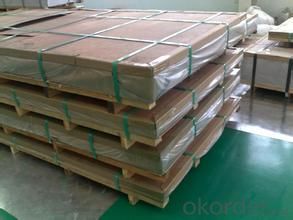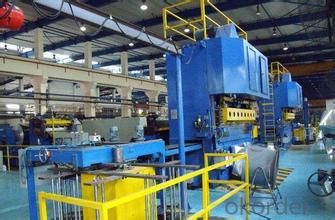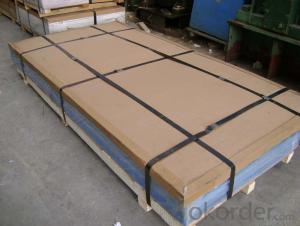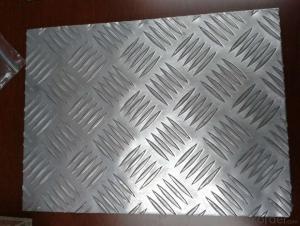Alu trade plate 3003 H14,big,samll five bars
- Loading Port:
- China Main Port
- Payment Terms:
- TT OR LC
- Min Order Qty:
- -
- Supply Capability:
- -
OKorder Service Pledge
OKorder Financial Service
You Might Also Like
Aluminium alloys (or aluminum alloys;see spellingdifferences) are alloys in which aluminium(Al) is the predominant metal. The typical alloying elements are copper, magnesium,manganese,silicon,tin and zinc. There are twoprincipal classifications, namely casting alloys and wrought alloys, both of which are furthersubdivided into the categories heat-treatableand non-heat treatable. About 85% of aluminium is used for wrought products,for example rolled plate, foils and extrusions.Cast aluminium alloys yield cost-effective products due to the low meltingpoint, although they generally have lower tensilestrengths than wrought alloys. The most important cast aluminiumalloy system is Al–Si, where the high levels of silicon (4.0–13%)contribute to give good casting characteristics. Aluminium alloys are widelyused in engineering structures and components where light weight or corrosionresistance is required
Finishing: Mill Finish, Painted,One Side Bright, Brushed and Coil Anodizing available on request
Alloy: AA1050,1060, 1100, AA3003, 3005, 3015, 5052, 5754, 5083,8011, etc
Temper: H14/16/18/22/24/32,HO etc.
Thickness:0.2mm—100mm
Width:100mm—2300mm (Can be slitted)
Standard: GB/T 3880-2006 ASTM B-209


- Q:How do aluminum coils contribute to improved indoor comfort?
- Aluminum coils play a crucial role in improving indoor comfort through their contribution to the functioning of HVAC (heating, ventilation, and air conditioning) systems. These coils are commonly used in air conditioning units and heat pumps to facilitate the heat transfer process. The primary function of aluminum coils is to absorb heat from the indoor air and release it outside. When warm air passes over the coils, the aluminum absorbs the heat, causing the refrigerant inside the coils to evaporate. This evaporation process cools down the air, which is then circulated back into the room, resulting in a more comfortable indoor environment. The use of aluminum for coil construction is advantageous due to its excellent thermal conductivity properties. Aluminum is highly efficient in transferring heat, enabling the coils to rapidly absorb and release thermal energy. This efficiency allows the HVAC system to cool down the indoor air more effectively and quickly, contributing to improved comfort levels. Furthermore, aluminum coils offer numerous benefits over other coil materials, such as copper. Aluminum is lightweight, making it easier for the HVAC system to operate efficiently. It is also corrosion-resistant, ensuring the longevity and durability of the coils. This resistance to corrosion prevents the formation of contaminants or blockages that could hinder the heat transfer process, ultimately maintaining optimal indoor comfort. In summary, aluminum coils contribute to improved indoor comfort by facilitating efficient heat transfer in HVAC systems. Their ability to absorb and release thermal energy quickly, combined with their lightweight and corrosion-resistant properties, ensures a more effective cooling process, resulting in a comfortable indoor environment for occupants.
- Q:Can aluminum coils be used for food processing equipment?
- Yes, aluminum coils can be used for food processing equipment. Aluminum is a common choice for food processing equipment due to its excellent thermal conductivity, corrosion resistance, and lightweight nature. It is widely used in the food industry for various applications such as heat exchangers, evaporators, and condensers. Aluminum coils are specifically designed to efficiently transfer heat and maintain a stable temperature, making them suitable for food processing equipment that requires precise temperature control. Additionally, aluminum is a non-toxic material, ensuring that it does not contaminate the food being processed. Therefore, aluminum coils are a reliable and safe choice for food processing equipment.
- Q:How are aluminum coils processed for specific mechanical properties?
- Aluminum coils are processed to achieve specific mechanical properties through a series of manufacturing techniques. These techniques are aimed at altering the structure and composition of the aluminum alloy, ultimately enhancing its desired properties such as strength, hardness, ductility, and corrosion resistance. One common method used to process aluminum coils is heat treatment. This involves heating the coils to a specific temperature and then cooling them rapidly or slowly to achieve the desired properties. For instance, annealing is a heat treatment process that involves heating the coils to a high temperature and then slowly cooling them to enhance their softness and ductility. On the other hand, precipitation hardening involves a combination of solution heat treatment and aging to increase the strength and hardness of the aluminum coils. Another method used to process aluminum coils is cold working or cold rolling. This involves passing the coils through a series of rollers at room temperature to reduce their thickness and improve their mechanical properties. Cold working not only increases the strength and hardness of the coils but can also enhance their surface finish and dimensional accuracy. Furthermore, alloying elements can be added to the aluminum alloy during the casting process to achieve specific mechanical properties. For example, adding elements like copper, magnesium, or zinc can enhance the strength and corrosion resistance of the aluminum coils. In summary, aluminum coils are processed for specific mechanical properties through techniques such as heat treatment, cold working, and alloying. These techniques help modify the structure and composition of the aluminum alloy, resulting in enhanced strength, hardness, ductility, and corrosion resistance.
- Q:Can aluminum coils be used for electrical connectors?
- Yes, aluminum coils can be used for electrical connectors. Aluminum is a commonly used material for electrical connectors due to its excellent conductivity, lightweight nature, and cost-effectiveness. However, it is important to note that aluminum has a lower conductivity compared to copper, so it may not be suitable for applications that require high electrical currents or low resistance connections.
- Q:What are the different types of aluminum coils?
- There are several different types of aluminum coils, including plain aluminum coils, painted aluminum coils, embossed aluminum coils, and coated aluminum coils. Each type has specific properties and uses, making them suitable for different applications in various industries.
- Q:Almost every restaraunt uses aluminium foils and polyehylene for packing foods - that you carry to home.How safe is this ?For how long would the temperature be mainitained ?and within what time if consumed and is it safe ?
- I was wondering about that too; I heard it somewhere before but it's one of those things that sits in the back of my mind till i see someone wrapping food in aluminum foil, every picky bone in my body tells me to yell no don't wrap my food in that but I just don't because there is no real harm in it. Only thing is it may change the flavor of your food after while. That part I remember:)
- Q:Can aluminum coils be used in low-friction applications?
- Low-friction applications can indeed make use of aluminum coils. Aluminum, being a lightweight and corrosion-resistant material, exhibits excellent thermal conductivity. These characteristics render it suitable for a variety of applications that prioritize low-friction. The automotive, aerospace, and HVAC industries often employ aluminum coils in heat exchangers, evaporators, condensers, and cooling coils. These coils are specifically designed to efficiently transfer heat while minimizing friction and energy loss. Furthermore, aluminum coils find utility in electrical motors, generators, and transformers, where smooth operation and reduced energy consumption are vital. Additionally, the lightweight nature of aluminum contributes to overall system weight reduction, thereby increasing efficiency. Moreover, various types of machinery and equipment that necessitate low friction, such as conveyor systems, sliding mechanisms, and bearings, can benefit from the utilization of aluminum coils. Aluminum's low coefficient of friction enables smooth and efficient movement, minimizing wear and tear on components. In conclusion, aluminum coils offer versatility in low-friction applications due to their lightweight, corrosion-resistant, and thermally conductive properties. Incorporating these coils can result in improved energy efficiency, reduced maintenance costs, and enhanced performance across a wide range of industries.
- Q:i came across marine grade aluminum (grade 6082), somebody was telling it is a special grade, i checked in internet, there is nothing specific in marine grade 6082, every manufacturer can produce it. please clarify. thanks
- Marine Grade Aluminum
- Q:Can aluminum coils be used in the manufacturing of medical devices?
- Yes, aluminum coils can be used in the manufacturing of medical devices. Aluminum is a lightweight and corrosion-resistant material that can be easily formed into coils, making it suitable for various medical applications such as imaging equipment, surgical instruments, and prosthetics.
- Q:What are the potential risks of using aluminum coils in specific applications?
- The potential risks of using aluminum coils in specific applications include corrosion, especially in environments with high humidity or acidic conditions. Aluminum coils are also more susceptible to damage and denting compared to other materials. Additionally, aluminum coils may have lower heat transfer capabilities, which could affect the efficiency of certain applications.
1. Manufacturer Overview |
|
|---|---|
| Location | |
| Year Established | |
| Annual Output Value | |
| Main Markets | |
| Company Certifications | |
2. Manufacturer Certificates |
|
|---|---|
| a) Certification Name | |
| Range | |
| Reference | |
| Validity Period | |
3. Manufacturer Capability |
|
|---|---|
| a)Trade Capacity | |
| Nearest Port | |
| Export Percentage | |
| No.of Employees in Trade Department | |
| Language Spoken: | |
| b)Factory Information | |
| Factory Size: | |
| No. of Production Lines | |
| Contract Manufacturing | |
| Product Price Range | |
Send your message to us
Alu trade plate 3003 H14,big,samll five bars
- Loading Port:
- China Main Port
- Payment Terms:
- TT OR LC
- Min Order Qty:
- -
- Supply Capability:
- -
OKorder Service Pledge
OKorder Financial Service
Similar products
New products
Hot products
Related keywords





























